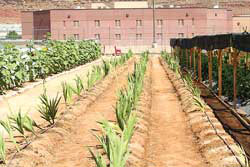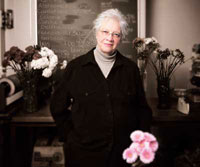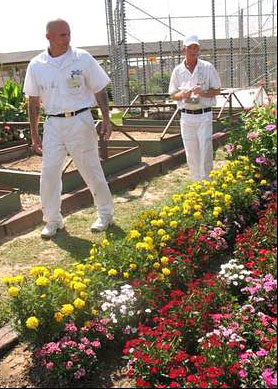Human Flower Project
Flowers in Purgatory
Note: Today we’re honored to post John Williams’ superb report on gardening and floristry projects in several North American prisons. Williams, based in Greater Chicago, is a “flower-lover” and business writer whose clients include 1-800-FLORALS. Rehabilitation, aesthetics, nutrition, productivity, magic—gardening’s rewards are the same on both sides of the razor wire.
Thank you, John!

Garden at Purgatory Correctional Facility
Photo: The Hurricane Journal
By John Williams
It’s not surprising that Tony Perez enjoys his time in the garden. “It’s wonderful—to watch it grow from nothing to something,” said Perez. “It allows you to get your mind thinking about what’s next in life.” But Perez’s garden spot is surprising: he works the soil in Utah’s Purgatory Correctional Facility, where he is an inmate.
What used to be a guard-dog training area in the prison is now an oasis of shade tarps, vegetables, fruit trees and vines. According to the Hurricane Valley Journal, “The garden began with just growing flowers and other plants that could be used to beautify county and public buildings. With a lot of hard work and effort, the garden has expanded to not only include flowers, but several varieties of vegetable plants and plans for a greenhouse.”
The garden is part of the prison’s inmate-management program, a hands-on approach that involves washing cars, construction, road clean-up, and work release opportunities too. Lt. Bob Cannon and Sgt. Tim Wiegert oversee the program. With the help of inmates and volunteers, Wiegert spent two weeks tilling the soil and preparing the plot. Most of the plants, irrigation equipment, fertilizer, shade covers, and concrete have been donated, and a state university extension agent has guided the project along.
The garden helps brighten up a dismal place. And its zucchini and tomatoes supplement the more than 80 pounds of vegetables served each mealtime at the institution. Just as important, the program teaches inmates responsibility and skills. Three inmates, including Perez, were initially assigned to the garden crew, and others have chipped in, expressing interest in joining the regular group. Perez has already been offered a job at a local nursery.
Plans for the fall include growing pumpkins to donate to local elementary schools for carving and decoration, an idea that came from one of the prisoners. “I’m very impressed to see the inmates get involved,” said Wiegert.
Purgatory is not the only prison to implement such a program. As far back as World War I, gardens have been documented in prisoner of war camps, such as the P.O.W. camp at Ruhleben, Germany, where British prisoners formed their own gardening club and were accepted into Britain’s Royal Horticultural Society.
 June Strandberg
June Strandberg
founder of the Beginnings program
Photo: Robert Karpa
Even so, it wasn’t easy for June Strandberg, the owner of Bayside School of Floral Design, when she decided she wanted to teach floral design to inmates at a women’s correctional facility in Vancouver, Canada. Inspired by two parolees who enrolled in her school and excelled under her tutelage, Strandberg campaigned for the idea after gaining support from Beverly Roest, the program director for the Burnaby Correctional Centre for Women. After a yearlong battle, the program “Beginnings” was launched in 1991 and met with astounding success. For the next 13 years, Beginnings crafted floral arrangements for more than 1,600 weddings, hosted annual floral shows, and created a number of award winning pieces, enabling many women to find their way back to free society.
More recently, gardening and floral programs have begun in correctional institutions across the U.S., meeting with surprising success. Not only do the programs brighten the atmosphere and provide inmates with productive work, they often – as at Purgatory—help cut food costs. Others, as at Beginnings, generate florist revenue through collaboration with local flower shops or more directly, with an operation based at the prison itself.
 Gardening behind walls
Gardening behind walls
Elmore County, Alabama
Photo: Alabama Dept. of Corrections
Today, at the state corrections facility in Elmore County, Alabama, inmates are cultivating a new garden behind walls. They plan to send the flowers they grow to local nursing homes and services for the elderly, reports the Montgomery Advertiser. “I’ve never really started something and carried it all the way through,” said William Kizziah, one of several inmates who works in the garden. Thanks to a local ministry known as the Order of St. Dismas, another garden has already sprouted up at Tutwiler Prison for Women in Wetumpka, and a third is being planned for Alabama’s nearby Staton Correctional Facility.
In Ohio, the Mansfield Correctional Institution’s horticultural program helps inmates grow plants to beautify the institution and surrounding community. The prison, local schools, and Ohio State Patrol Grounds are all decorated with the results.
In Massachusetts, nine hot houses and a farm are operated by the Barnstable County Jail, where inmates grow and sell some 40,000 annuals each year. The program was developed 12 years ago to teach flower growing and business basics. The farm grows vegetables, trees and hay. Food grown on the farm is used for inmates or donated to food pantries. According to the Barnstable Patriot, “Any profit from the sale of products is plowed into the programs for the inmates, such as hiring additional drug and alcohol counselors, buying computers and paying for educational programs.”
Illinois has an especially well developed program. Since 1994, when the Illinois Department of Corrections (IDOC) began collaborating with the state’s Department of Agriculture, IDOC inmates have helped cultivate more than 230 flowerbeds and 300 other floral baskets and containers at the 360-acre Illinois Fairgrounds. “Such programs not only benefit our communities and help inmates return to society but also serve as a valuable asset to the taxpayer,” says IDOC Director Roger E. Walker Jr. “The agency’s work camps serve… by giving inmates a structured, specialized agenda that develops responsibility, self discipline, self-respect and the importance of a good work ethic.”
With the help of local volunteers, horticultural experts, and civic support, green prison programs are making a difference for inmates and communities. According to Sgt. Wiegert, “We want to show people what we are doing and how they can benefit.” J.R. Phillip, a sixty-year veteran of the floral business, couldn’t agree more. “Not only do flowers and plants brighten up our everyday lives,” said Phillip, “but in some cases they give life a whole new beginning.”
Comments
Dear M.,
Terrific idea!
The June Stranberg example John cites is such a strong one, about how such programs can take hold in the prison system if everyday citizens are willing to put in the time and effort.
Have you, along with a local gardening or ecology group perhaps, considered pursuing such a project at a prison in your vicinity? Please keep us informed.
All good wishes,
Julie
Flowers and gardening are indeed therapeutic, regenerating, and even rehabilitating. Author and director Jean Trounstine speaks in her writings about a prison gardener, named Mamie, “…who brought dried flowers and made cards for her family, got cancer and told me after they shipped her to a prison hospital, ‘I have my own room, a window. I look out on a patch of green. It’s almost like being free.’” Trees, grass, even a tiny seedling—they’re all somehow nourishment for the hungry soul.
Similar horticultural programs have been active at several Michigan prisons that grow flowers for state motorists’ welcome centers.
Finally..A GOOD idea for prisons…I what a wonderful idea!! I know my garden has literally saved my sanity many times…
Tracy
Flowers and gardening in prisons is a great idea. Some might say that flowers are have a calming and great to look at and can in time, the prisoners can have an appreciation and care for them which in turn may reflect in their attitude when they get parole. Others may argue that flowers themselves have no value other than looks. Perhaps growing fruit and vegetables could be more produtive so the prisoners can each organic fruit and vegetables. So I give up my thumbs up to flowers.
As the originator of the flower gardens mentioned in your article at Elmore County & Tutwiler prisons in Alabama, let me add a few comments.
As stated by many, flower gardening is theraputic for the inmates. But it goes much farther than that. The inmates involved with the projects get a feeling of satisfaction (very often expressed) of giving back to society in a way that they can. It gives them a feeling of belonging to the world again. It entices them to come up with other ideas to help each other, like a small bouquet on every table in the chow hall for inmates who haven’t seen flowers in years.
And the fruits of their labor go beyond the prison walls. It is really heartwarming to see a tear in the eye of an elderly person in a nursing home who is given a bouquet of flowers with a note saying someone in prison is thinking of them. (When you stop to think about it, they have a lot in common except the high fences.) Or bouquets going to a VA nursing home with an American Flag card saying “We’re proud of you.”
And then comes the “thank you’ letters back to prison inmates stating how much their flowers & cards meant to the recipients. Again that little tear showing that even though they incarcerated, they have done something nice for a stranger they will probably never meet.
It is a very rewarding project for all who are involved, including me.
Bob S.


Would be nice to also see them working on some substainable agriculture projects and experiments in those conditions.
M. Anthony
Send Flowers